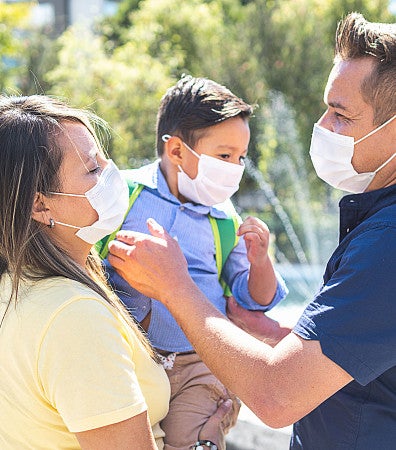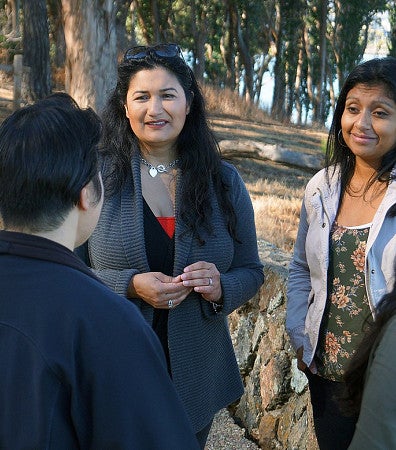Active Projects
Prevention Center: Parenting Among Women who are Opioid Users

Opioid use in young adults is rising at unprecedented levels and has reached epidemic proportions in some areas of the country, particularly rural areas. The long-term goal of this Center of Excellence, “Center on Parenting and Opioids (CPO),” is to improve the well-being of individuals, families, and communities affected by the opioid crisis through a focus on behavioral (parental responsivity, warmth) and neurocognitive systems (e.g., executive functioning, reward responsiveness) that are underlying mechanisms common to both addiction issues and parenting challenges.
The Center includes three research projects, an administrative core, a pilot and training core, and a data science core. The research projects and cores are based upon a unifying conceptual model and employ a translational science approach in which basic science investigations of underlying mechanisms are leveraged in the development and evaluation of scalable interventions that are designed to deliver population-level impacts on policy and practice.
Dr. Leve is contact Principal Investigator (PI) on the Center, PI on the administrative core, and Co-I on a supplement of research project 2, which has the goal of developing and testing a telehealth intervention for young adult parents living in rural areas who have had a history of substance misuse to prevent opioid misuse.
Directors of the Three Projects and Cores:
- Leslie Leve (PI) – University of Oregon
- Phil Fisher (PI) – Stanford University
- Beth Stormshak – University of Oregon
- David DeGarmo – University of Oregon
- Elliott Berkman – University of Oregon
- Damien A. Fair – University of Minnesota
- Kristen L. Mackiewicz Seghete – Oregon Health & Science University
Funder: NIDA, P50 DA048756
Oregon Saludable: Juntos Podemos (OSJP)

The global SARS-CoV-2 pandemic that causes the severe respiratory illness COVID-19 is the worst health crisis that the United States has faced in a century. Although this highly contagious virus has infected millions of Americans already, the disease burdens are disproportionately born by historically underserved populations such as Latinx communities. An urgent need exists to reach Oregon's Latinx community to prevent SARS-CoV-2 transmission and increase vaccine acceptance. Oregon Saludable: Juntos Podemos (OSJP) seeks to expand COVID-19 testing to underserved Latina/o/x communities across the state of Oregon, in collaboration with county and community partners. Testing events include culturally tailored outreach and a ‘Promotores de Salud’ health intervention with the goal of improving reach, access, and uptake of testing among Latinx communities, as well as addressing vaccine hesitancy.
Over time, this project will help communities institutionalize optimal local testing frameworks supported by University of Oregon laboratory facilities for testing capacity, technical support for testing logistics, and collection of data on health behaviors, testing rates, and sustainability. The resulting structures and systems will be poised for future scale-up to other vulnerable communities and/or for other public health purposes.This project is fully integrated with the National Institutes of Health (NIH) Rapid Acceleration of Diagnostics (RADx) consortium and its Coordination and Data Collection Center (CDCC).
- Leslie Leve (PI)– University of Oregon
- David DeGarmo (PI) – University of Oregon
- William Cresko (PI) – University of Oregon
Funder: NIH, P50 DA048756-02S2; NIDA, P50 DA048756-03S3
Turning Points

Women are the fastest growing incarcerated population in the United States. There are approximately 1.2 million women under the supervision of the criminal justice system over 200,000 women incarcerated in jails or prisons. In 2015, girls represented approximately 29% of all juvenile arrests and accounted for 15% of youth in placement. Though researchers and policymakers increasingly recognize the importance of understanding female offending, there is relatively little known about the longitudinal trajectories of female offending. We also know little about the potential negative outcomes of these trajectories, and the protective and risk processes that contribute not only to persistence, but also to desistance from adult offending, specifically for women.
The Turning Points Study builds on an existing longitudinal study to further our understanding of the trajectories of women’s justice involvement across adolescence and adulthood. It is one of the longest ongoing studies examining women’s involvement in the juvenile justice and criminal justice systems.
Our team will focus on understanding trajectories of trauma exposure and its sequalae, in order to identify salient points for prevention and intervention efforts. Another key goal of the project is to understand whether Treatment Foster Care Oregon (TFCO) delivered during adolescence has long-term benefits for women’s physiological health, as measured through an index of allostatic load.
Study Investigators:
- Leslie Leve (PI) – University of Oregon
- Maria Schweer (PI) – University of Oregon
Funder: National Institute of Justice NIJ 2020-JX-FX-0003
Study Update: The Turning Points Study is in active data collection. We hope to share preliminary findings in early 2024.
ECHO (Early Growth and Development Study Pediatric Cohort)

It is clear that both biological and environmental factors play a role in the unfolding of health problems beginning very early in development, yet the specific mechanisms and processes that lead to healthy development versus illness are not well understood. We are using our well-established prospective adoption sample (Early Growth and Development Study; EGDS) to (a) help clarify causal inferences about environmental influences on neurodevelopment and obesity, and (b) explore the unfolding interplay between inherited child characteristics and environmental influences from birth to adolescence.
In the first phase (UG3), we re-recruited and interviewed families of 1,000 children from EGDS, including adoptees, biological children, and their siblings. Now we are visiting families in their homes to learn more about child health and human development. When combined with other ECHO pediatric cohorts, the data generated and analyses conducted in this study will lead to improved guidance for future prevention efforts aimed at offsetting inherited risks and maximizing inherited strengths to promote healthy development.
Study Investigators:
- Leslie Leve (PI) – University of Oregon
- Jenae Neiderhiser (PI) – Penn State
- Jody Ganiban (PI) – The George Washington University
- David Reiss – Yale University
Funder: NIH Office of the Director UH3 OD023389
Early Growth and Development Study (EGDS) - Adolescence

The study aims to clarify how heritable risks and prenatal and postnatal environments work together with hormonal changes to influence the development of risk for early substance use (SU) and related problems in adolescence. We are collecting new data from EGDS participants as they enter and progress through adolescence on SU milestones, behavioral risk for SU, and pubertal development.
This study will help to advance knowledge of the development of adolescent SU, will help clarify which children are at greatest risk for developing SU and related behaviors early in adolescence, and to indicate which influences are most salient for SU development given multiple other influences.
Study Investigators:
- Jenae Neiderhiser (PI) – Penn State
- Leslie Leve – University of Oregon
- Kristine Marceau – Purdue University
- Elizabeth Shirtcliff – Iowa State University
Funder: NIDA R01 DA045108
Externally-Funded Projects in Analysis-Only Mode (no active data collection):
Paths 2 the Future: Testing the Efficacy of a Career Development Intervention for High School Girls with Disabilities

The purpose of this Goal Three efficacy study is to determine whether the Paths 2 the Future (P2F) intervention produces a beneficial impact on education and career outcomes for high school girls with high-incidence disabilities relative to a counterfactual. P2F is a fully developed, gender-specific career development intervention that, when pilot tested, showed preliminary evidence of efficacy under a Goal Two Institute of Education Sciences study.
Study Investigators:
- Leslie Leve – University of Oregon
- Lauren Lindstrom (PI) – UC Davis
- Atika Khurana – University of Oregon
- David DeGarmo – University of Oregon
Funder: Institute of Education Sciences (IES) (R324A170148)
Early Growth and Development Study (EGDS)

The Early Growth & Development Study (EGDS) is a nationwide, prospective study of birth parents and adoptive families aimed at investigating how families can help their children develop to their fullest potential. Our study builds on emerging evidence about the relationship between heredity and the family environment—that is, nature and nurture—and how the two work together and separately in child development. This study is the first of its kind to examine such issues and general adoption issues such as openness.
EGDS-School follows the original sample of children with a focus on school readiness and executive functioning (basic abilities such as memory and attention). EGDS-Phase 2 examines the influences of the prenatal environment, the family environment, and heredity on child development. EGDS-NIMH examines pathways to the development of early emerging emotional and behavioral symptoms and to later psychiatric symptoms in middle childhood.
The fourth and most recent phase is EGDS-Health which focuses on the eating habits and behaviors of adoptive parents, their children, and of birth parents, examining family dietary habits, food preferences, physical activities, and child growth patterns from birth to middle childhood.
Study Investigators:
- Leslie Leve (PI) – University of Oregon
- Jenae Neiderhiser (PI) – Penn State
- David Reiss (PI) – Yale University
- Jody Ganiban (PI) – The George Washington University
- Misaki Natsuaki – University of California, Riverside
- Daniel Shaw – The University of Pittsburgh
Funder: NICHD (R01 HD042608, R56 HD042608), NIDA (R01 DA020585), NIMH (R01 MH092118), NIDDK (R01 DK090264)
Siblings Reared Apart: A Naturalistic Cross-Fostering Study of Young Children

This study used a siblings-reared-apart design to better understand childhood pathways to risk and protective factors associated with social competence, academic competence, and behavior problems. We focused on examining characteristics of the rearing environment that are known to be associated with child developmental outcomes.
The sample consisted of 216 sibling pairs in which one sibling was reared from birth with their birth parent, and the other sibling was reared from birth by an adoptive family. Children and their families completed interviews, home visits, and questionnaires when their child was 7 years old.
Study Investigators:
- Leslie Leve (PI) – University of Oregon
- Jenae Neiderhiser – Penn State
- Misaki Natsuaki – University of California, Riverside
Funder: NIDA (R01 DA035062)
Girls Longitudinal Study (GLO)

The major goals of this project were to (a) specify developmental trajectories in young adult females at risk, (b) examine the effects of the Treatment Foster Care Oregon (TFCO) intervention on young adult outcomes, and (c) examine the cost effectiveness and cost avoidance of the TFCO intervention on outcomes.
This work is some of the only evidence-based work on interventions for adolescent females in the juvenile justice system.
Study Investigators:
- Leslie Leve (PI) – University of Oregon
- David Kerr (PI) – Oregon State University
- Patricia Chamberlain (PI) – Oregon Social Learning Center
- Lisa Saldana – Oregon Social Learning Center
Funder: NIDA (R01 DA024672) and NIMH (R21 MH091611). Funding for the original studies was provided by NIMH (R01 MH054257) and NIDA (R01 DA027091)
Safe, Healthy, Adolescent Relationships and Peers (SHARP)

This study was one of three research components within the NIDA-funded P50 Transitional Drug Abuse Prevention Center. The overall aim of this study was to better understand risk and protective factors related to drug use and sexual risk behavior in females age 13 - 18, and to develop and test a preventive intervention for this population.
The study had two components. Component 1 included qualitative interviews with 15 young women that asked about situations and factors that played into their teenage experiences of having unprotected voluntary sexual contacts and asked to give input on how well the proposed intervention components might help prevent high school girls from engaging in drug use and sexual-risk behavior. Using the information derived from these interviews, Component 2 included the development and testing of an intervention for females who were receiving services from the juvenile justice center or regional community agencies (n = 122; the Safe, Healthy, Adolescent Relationships and Peers intervention; SHARP). Young women and their parent participated in interviews at baseline, 6, and 12 months.
To examine the role of brain development and stress in the young women’s outcomes, a subset of young women (n = 25) participated in a neuroimaging component, and a subset of young women (n = 50) participated in a study of the role of oxidative stress.
Study Investigators:
- Leslie Leve (PI) – University of Oregon
- Patricia Chamberlain – Oregon Social Learning Center
- Rohanna Buchanan – Oregon Social Learning Center
Funder: NIDA, P50 DA035763, Research Project 2)

The Middle School Success Project examined the effectiveness of providing enhanced, focused services for pre-adolescent girls in foster care.
The intervention was designed to prevent problems that could affect the girls’ futures. The families in the intervention group attended weekly group and individual skills training and support throughout the girls’ first year in middle school. The families in the control group received services “as usual” from Child Welfare and/or their schools. Girls in foster care and their foster parents participated in in-person and telephone interviews, five times over the course of 36 months. Youth were then followed into adolescence (age 15–17) to help investigate how decision-making processes might be associated with healthy and health-risking behaviors in adolescent girls. The youth participated in an in-person, analog decision-making assessment, and youth and their caregiver completed questionnaires about their behaviors and decision making strategies.
Study Investigators:
- Leslie Leve (PI) – University of Oregon
- Patricia Chamberlain (PI) – Oregon Social Learning Center
- Joshua Weller (PI) – Tilburg University
Funder: NIMH (R01 MH054257), National Institute on Drug Abuse (R21 DA027091)
